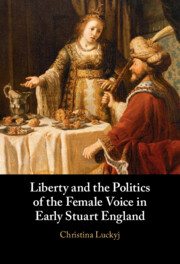3 results
6 - Anger, Rhetoric, and Early Women Essayists
- from Part I - Forming the British Essay
-
-
- Book:
- The Cambridge History of the British Essay
- Published online:
- 31 October 2024
- Print publication:
- 04 July 2024, pp 77-91
-
- Chapter
- Export citation
Chapter 5 - Rachel Speght and the “Criticall Reader”
-
- Book:
- Liberty and the Politics of the Female Voice in Early Stuart England
- Published online:
- 24 February 2022
- Print publication:
- 03 March 2022, pp 147-174
-
- Chapter
- Export citation

Liberty and the Politics of the Female Voice in Early Stuart England
-
- Published online:
- 24 February 2022
- Print publication:
- 03 March 2022

